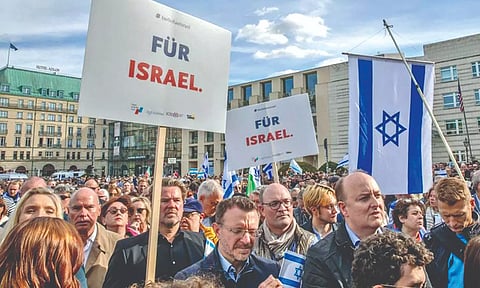

By PHILIPP JEDICKE
WASHINGTON: Immediately after the large-scale terrorist attacks on Israel by the militant Islamist Hamas, numerous Hollywood stars and other cultural figures in the US expressed their solidarity with the country under the hashtag #standwithisrael.
In several German cities, including Berlin, Munich, and Rostock, many have demonstrated their solidarity with Israel at rallies in recent days. But Germany’s cultural institutions remained reticent. For example, it was not until October 11, four days after the attacks, that the German Cultural Council issued a statement that said it “resolutely opposes any form of antisemitism” and called on cultural institutions in Germany to clearly show their solidarity with Israel. From this call, it is perhaps possible to see what journalist and author Simon Strauss denounced in German daily Frankfurter Allgemeine Zeitung: “Where are the Israeli flags? Where are the banners, the posters, the placards?”
Comparing the situation with the prompt declarations of solidarity with Ukraine following Russia’s invasion, Strauss made it very clear in his article what he actually expects from Germany: More solidarity with Israel. After all, Israel’s security and right to exist is Germany’s reason for State, after Germany’s systematic murder of six million Jews in the Holocaust. This reason of state is supported by the current government’s coalition agreement and has been reaffirmed by Chancellor Olaf Scholz in a government statement on October 12, 2023. In his October 11 Spiegel Online column titled “Why are you still silent?”, author Sascha Lobo elaborated on the manifold reasons for the stubborn silence of many people who otherwise regularly speak out about grievances on social media.
He says, “Those who live in Germany today are not to blame for the Holocaust. But all those living here bear the responsibility to learn from it. And that can in no way mean remaining silent about antisemitic terrorism.” The silence does not seem to be just a German problem.
On the Artnet news site, which focuses on the international art trade, Jewish editor Katya Kazakina wrote of a “deafening silence” in the art world — especially from renowned and long-established galleries and museums, which in the past frequently spoke out when it came to defending human rights, as in the case of the Ukraine war, Black Lives Matter or LGBTQ rights.
“In New York, the home of the largest Jewish population outside of Israel, not a single major museum has so far expressed its official support for the Jewish state and, by extension, the Jewish people,” Kazakina wrote on October 12.
“Not one major gallery chose to send a message of empathy and take a public stand against the slaughter of Jewish civilians.” She added, “As a Jewish woman, who’s been writing about art, artists, galleries, museums, auction houses, foundations, fairs, and lawsuits for more than 17 years, I feel a mixture of pain, disappointment, rage, and fear. (...) Where is the solidarity? Where is the empathy? Where is the moral compass?”
In their articles, Strauss, Lobo, and Kazakina look for reasons why so little solidarity with Israel has been shown so far. Is it the fear of being seen as a “colonialist” in view of the suffering of the Palestinian civilian population in the Gaza Strip? Or is it ultimately antisemitic tendencies that have led to this “deafening silence”? Perhaps it is also the fear of Islamist terrorism. For example, the organizer of the solidarity demonstration for Israel in Munich has received death threats. There may be many reasons for this silence, but the result remains the same: People of Jewish faith, already deeply shocked by the current events in Israel, are now further unsettled by this.